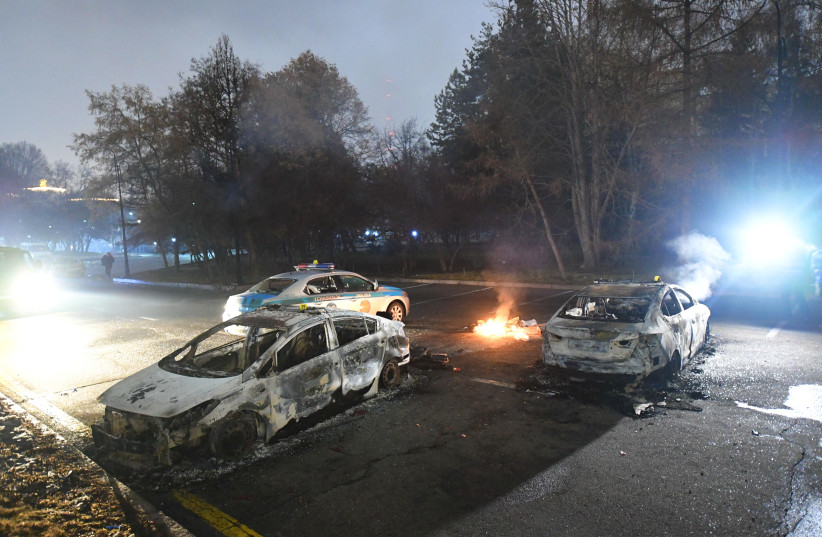A 22-year-old Israeli man named Levan Kogeashvili was killed in Almaty, Kazakhstan on Friday during a violent protest, Israel's Foreign Ministry announced.
Kogeashvili was struck by gunfire near his home while driving to work, Rostislav Edelstein, a friend of Kogeashvili’s family, told Walla. He said that Kogeashvili was taken to a hospital but attempts to revive him failed. Two Kazakhstanis in the vehicle were lightly injured. Edelstein said that Kogeashvili was not involved in the civil unrest that has gripped the central Asian state for several days.
Kogeashvili’s family immigrated to Israel in the 1990s, where he was born, according to Walla. He was raised in Ashdod, but completed his secondary studies in Kazakhstan. Edelstein told Walla that over a year ago Kogeashvili had married a Jewish Kazakhstani woman, and the couple has a young son around half a year old.
The MFA is in contact with his parents in Kazakhstan and family in Israel and is assisting in the transfer of his body to Israel for burial, the ministry said. The MFA expressed that it is mourning Kogeashvili’s loss, and requested that Israelis heed its previous statements advising against non-essential visits. The MFA is not yet recommending that Israelis leave the country.
On Thursday, the MFA said in a statement from its consular affairs division that "Israeli citizens considering coming to the country are advised to exercise extra caution and avoid non-essential visits to the country. Further, Israeli citizens residing in the country are advised to refrain from attending mass gatherings, restrict movements and travel, including moving from work from home if possible, and follow government guidelines."
The statement was coupled with a submission form for Israelis in Kazakhstan to provide their details to the Israeli embassy in Kazakhstan.
"The Israeli Ministry of Foreign Affairs is closely following developments in Kazakhstan and hopes to see calm and order restored," tweeted Foreign Ministry spokesperson Lior Haiat on Friday morning. "The Israeli Embassy in Nur-Sultan, along with the Foreign Ministry headquarters in Jerusalem, are in direct contact with Israeli citizens who are in the country in order to assist them during these times."
Kazakhstan has been in a state of civil unrest since January 3, in response to price caps being removed from butane and propane on January 1. The reforms added to disquiet over COVID-19 restrictions, corruption and economic issues.
Rioters sacked and seized key public buildings in several regions, including in the cities of Almaty, where Kogeashvili was killed, and Nur-Sultan, the capital. By Friday, at least 26 Kazakhstani citizens and 18 police and national guard service members were killed in the unrest, according to the Interior Ministry. Eli Nacht, deputy mayor of Ashdod, said on Saturday that "the situation there is catastrophic, the morgues are full, there were about five hundred bodies.” Kogeashvili’s parents had gone to Almaty to identify their son’s body. “The whole family will return to Israel, the question is when," said Nacht.
Over 4400 people have been detained. The Israeli MFA reported that since January 5 Kazakhstan has been in a state of emergency and a curfew has been imposed in a number of hotspots, restricting activity to 7:00 am and 11:00 pm. Internet access was blocked for most of the week, and still sporadic on Saturday.
On Thursday, Russian military forces were deployed to aid in restoring order at the request of Kazakhstan's government. On Friday morning, it was reported by Reuters that unrest had largely been quelled, but reports of sporadic gunfire persisted. Later in the day, Kazakhstan President Kassym-Jomart Tokayev said in a televised address that he had given orders "to kill the rioters," and that "those who do not surrender -- will be eliminated."
Tokayev tweeted on Friday evening that the civil unrest was the result of an “armed act of aggression well prepared and coordinated by perpetrators and terrorist groups trained outside the country.” He said that an investigation would be conducted to discover the root causes of the violence. On Saturday, former intelligence chief Karim Massimov was arrested under suspicion of treason, according to the state security agency.

"The good and strong relationship between the State of Israel and the Republic of Kazakhstan is based on the warm relations between the peoples and the fruitful cooperation between the governments," Haiat also said in Friday's statement. "As a key country in Central Asia and the founder of the CICA Forum for Peace, Security and Regional Stability, we look forward to the restoration of stability and calm in Kazakhstan soon."
In 2017, former Israeli ambassador to Kazakhstan Michael Brodsky said that the Muslim majority nation is one of Israel’s major friends, and emphasized the cooperation between the states in health, security and agricultural fields.
Israel has developed strong diplomatic and economic ties with Kazakhstan -- which is a regional economic and energy powerhouse as the world's top producer of uranium, ninth-biggest oil exporter, 10th largest producer of coal, and second-largest miner of bitcoin.
In December 2016, then prime minister Benjamin Netanyahu visited Kazakhstan when Nursultan Nazarbayev was still president. While Nazarbayev has since stepped down, he is reportedly seen as being the true political power behind the current president, and much of the protestor’s ire has been directed at the former official leader. Nazarbayev retained a position as head of the state’s Security Council but was removed on Wednesday, along with his deputy.
Kazakhstan has around 10,000 Jews in the country -- and according to Brodsky's 2016 statements, many Israeli companies operate there -- but the MFA does not know how many Israelis are in Kazakhstan, and if any others are in danger.
Udi Shaham and Reuters contributed to this story.
